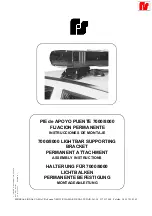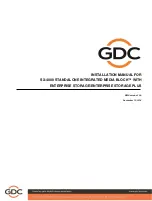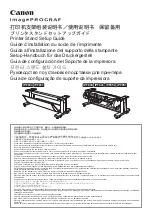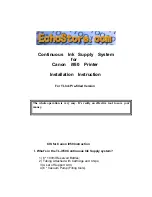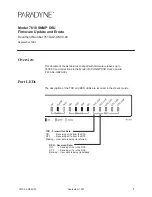
C 150 (E2) 06/2011
page 28/78
Open the CO
2
supply's pressure reducer valve and set a CO
2
primary pressure of 2.0 bar /
29 psi
.
Set the main power switch (2) to position I. The pilot lamp shows the unit is ready for operation. There is
a subsequent brief startup phase in which the display items at the edges of the upper controller display
light up successively.
After a few seconds, the upper display shows the current interior temperature of the C 150 and the lower
display shows the current CO
2
interior concentration. The lit LEDs at the right of the display show that the
temperature is displayed in °C and the CO
2
concentration is displayed in vol.-% CO
2
.
Figure 19: Normal display of controller after turning on the
incubator, showing the current temperature and CO
2
val-
ues (example)
Set the controller to the desired temperature and CO
2
set points that are to be used to operate the C 150.
The yellow LED indicates that the heating is active, and the yellow LED
indicates that the CO
2
valve is open.
Only insert samples into the C 150 when it has reached its stable operating state:
Temperature:
Equilibration time is approx. 2 hours.
CO
2
:
After approx. 5 minutes, the CO
2
concentration equilibrates automatically to the preset value.
If there is no accordance between the actual and set value shown in the display, proper op-
eration of the unit is not guaranteed.
Instructions when observing leakage of condensate from the CO
2
sensor system and CO
2
fluctua-
tion:
In the case of CO
2
fluctuations and concomitant condensate leakage from the injection and suction noz-
zle of the CO
2
sensor compartment after start-up or when taking the unit back into service, the unit should
be left to dry open for at least an hour running at 37 °C with the water pan empty. This will result in flush-
ing the sensor compartment and tubings from humid air. Removing the condensate from the CO
2
sensor
system will ensure a turbulence-free CO
2
measurement.
7.
Controller RP1 operating modes
The controller provides three operating modes HAND (chap. 7.2), USER (chap. 7.3), and LOCK (chap.
7.4). In operating modes HAND and USER, you can call up several operating functions and set / modify
their values.
Operating mode USER is password protected. On delivery, the password is set to “1” (factory setting).
You can change the password in operating function “
PA.U
” (chap. 7.3).
You can also implement password protection for operating mode HAND (chap. 7.4).
Summary of Contents for APT.line C 150
Page 75: ...C 150 E2 06 2011 page 75 78 18 9 Dimensions C 150...
Page 79: ......































